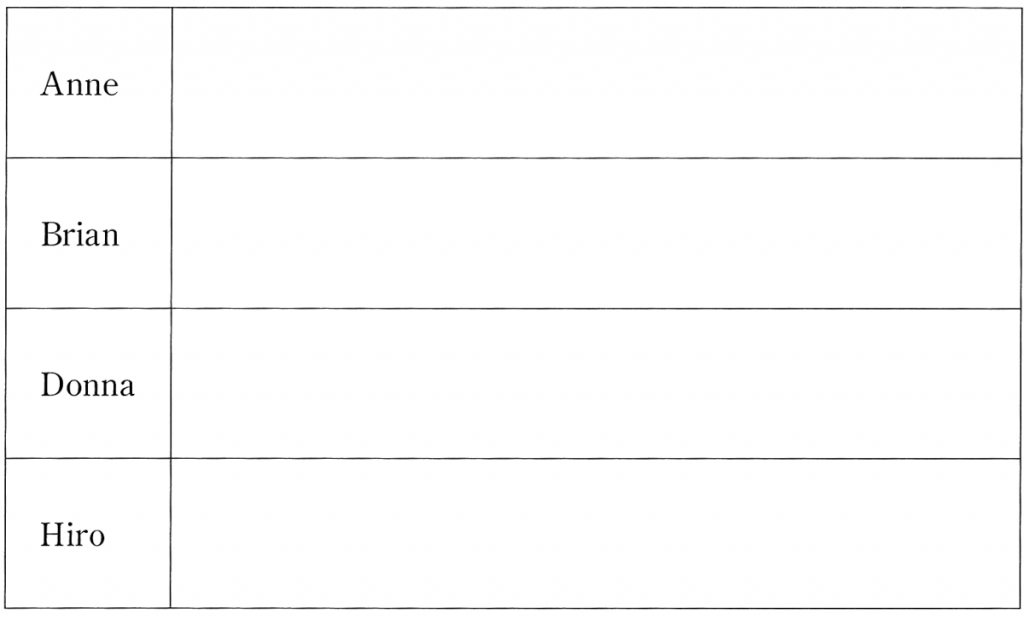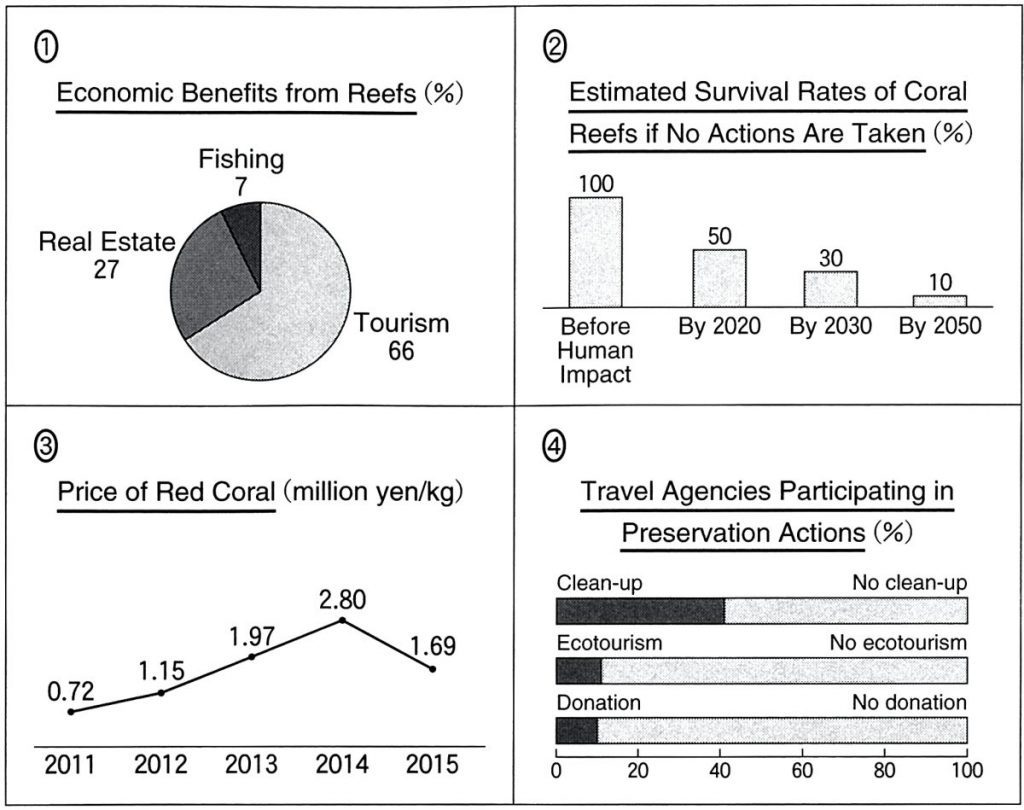【スマホで聞ける!スクリプト付き共通テスト過去問】英語(リスニング)2022本試(音声・問題・正解・和訳)
第6問A
音声は1回流れます。
第6問はAとBの二つの部分に分かれています。
問34・35
A 第6問Aは問34・問35の2問です。二人の対話を聞き,それぞれの問いの答えとして最も適切なものを,四つの選択肢(①~④)のうちから一つずつ選びなさい。(問いの英文は書かれています)。状況と問いを読む時間が与えられた後,音声が流れます。
状況
Julia が,Tom と料理について話をしています。

問34 What is Tom’s main point?
① Certain dishes are difficult to make.
② Imagination is an important part of cooking.
③ Some ingredients are essential for flavor.
④ Successful recipes include many steps.
問35 What does Julia think about cooking?
① Cooking creatively is more fun than following a recipe.
② Cooking with feeling is the highest priority.
③ It is easy to make a mistake with measurements.
④ Preparing food requires clear directions.
問34 正解 2 問35 正解 4
Julia: Oh, no. I’m out of butter.
Tom: What are you making, Julia?
Julia: I was going to make an omelet.
Tom: How about using olive oil instead?
Julia: But, Tom, the recipe says to use butter.
Tom: Why don’t you just change the recipe?
Julia: I don’t like cooking that way.
Tom: I just throw together whatever is in the refrigerator. For me, cooking is a creative act.
Julia: Not for me. I need to follow a recipe.
Tom: I like to think about how the ingredients will combine.
Julia: I don’t have to think about it if I follow a recipe precisely. I use measuring spoons, a measuring cup, and a step-by-step recipe. You like my food, don’t you?
Tom: Absolutely. Your beef stew is especially delicious.
Julia: See? There is something to be said for sticking to a plan. And without butter I cannot make an omelet.
Tom: OK. So, what are you going to do with those eggs?
Julia: How about boiled eggs? Where’s the recipe?
stick to ~に忠実である
ジュリア:まあ。バターが切れてしまいました。
トム:何作ってるのですか,ジュリア。
ジュリア:オムレツを作るつもりです。
トム:代わりにオリーブオイルを使うのはどうですか。
ジュリア:でも,トム,レシピにはバターを使うように書いてあります。
トム:レシピを変えてはどうですか。
ジュリア:そのような調理方法は好きではありません。
トム:私は冷蔵庫にあるものを何でもかき集めるだけです。私にとって,料理は創造的な行為です。
ジュリア:私は違います。私はレシピに従う必要があります。
トム:私は材料の組み合わせ方を考えるのが好きです。
ジュリア:レシピに正確に従えば,それについて考える必要はありません。私は計量スプーンや計量カップ,段階を踏んだレシピを使います。あなたは私の料理が好きですよね。
トム:もちろんです。あなたのビーフシチューは特に美味しいです。
ジュリア:ほらね。計画に忠実であることにはそれなりに意味があるのです。それで,バター無しでは私はオムレツは作れません。
トム:わかりました。それなら,それらの卵はどうするつもりですか。
ジュリア: ゆで卵はどうでしょう。レシピはどこにありますか。
問34 トムの趣旨は何か。
① 特定の料理は作るのは難しい。
② 想像力は料理の重要な部分である。
③ いくつかの材料は風味に欠かせないものである。
④ 上手なレシピには多くの段取りが含まれる。
問35 ジュリアは料理についてどう考えているか。
① 創造的に料理することは,レシピに従うことよりも楽しい。
② 感覚的に料理することは最も優先すべきことである。
③ 計量は間違えやすい
④ 食べ物を用意するには明確な指示が必要である。
第6問B
問36・37
第6問Bは問36・問37の2問です。会話を聞き,それぞれの問いの答えとして最も適切なものを,選択肢のうちから一つずつ選びなさい。後の表をもとにメモをとってもかまいません。状況と問いを読む時間が与えられた後,音声が流れます。
状況
旅先で,四人の学生(Anne, Brian, Donna, Hiro)が,通りかかった店の前で話をしています。
問36 四人のうちエコツーリズムに賛成しているのは何人ですか。四つの選択肢(①~④)のうちから一つ選びなさい。
① 1人
② 2人
③ 3人
④ 4人
問37 会話を踏まえて,Brianの考えの根拠となる図表を,四つの選択肢(①~④)のうちから一つ選びなさい。

問36 正解 3 問37 正解 2
Anne: Hey, Brian. Look at that beautiful red coral necklace. Ooh… expensive.
Brian: Anne, red coral is endangered. They shouldn’t be selling that.
Anne: So, how are they going to make money?
Brian: There’re lots of ways to do that if we consider ecotourism.
Anne: Yeah… ecotourism…. What do you think, Donna?
Donna: Well, Anne, ecotourism supports the local economy in a good way while protecting the environment.
Brian: Right. So, we shouldn’t buy coral; it’ll become extinct.
Anne: Oh, come on, Brian. How about the people relying on the coral reefs?
Brian: But, Anne, those coral reefs take millions of years to regrow. We should support more sustainable ways to make money.
Donna: Hey Hiro, didn’t you buy some photos of coral reefs?
Hiro: Yeah, taken by a local photographer. They are beautiful.
Donna: That’s ecotourism. We shouldn’t impact the environment so much.
Hiro: But that’s not enough to support people relying on coral reefs for income.
Brian: Hiro has a point. They should find other ways to make money while still preserving the reefs.
Anne: I’m not sure if we are in a position to tell them how they should make their money.
Hiro: Anne’s right. Selling coral is their local tradition. We should respect that.
Donna: But, at the expense of the environment, Hiro?
Hiro: The environment is important, but if we protect it, I don’t think the economy is supported.
Brian: Anyway, we’re on vacation. It’s a nice day.
Donna: Let’s hit the beach!
coral サンゴ coral reef サンゴ礁
at the expense of ~を犠牲にして
アン:ねえ,ブライアン。あのきれいな赤い珊瑚のネックレスを見て。ああ,高いですね。
ブライアン:アン,赤珊瑚は絶滅の危機に瀕しています。店はそれを売るべきではありません。
アン:それなら,店はどうやってお金を稼ぐのですか。
ブライアン:エコツーリズムを考えれば,そうする方法はたくさんあります。
アン:そう,エコツーリズム・・・。ドナ,あなたはどう思いますか。
ドナ:そうですね,アン,エコツーリズムは環境を保護しながら,良い意味で地域経済を支えています。
ブライアン:その通り。だから,私たちはサンゴを買うべきではありません。絶滅してしまいます。
アン:ええ,まさか,ブライアン。サンゴ礁に頼っている人々はどうするのですか。
ブライアン:でも,アン,それらのサンゴ礁は再生するのに何百万年もかかります。私たちはお金を稼ぐのにもっと持続可能な方法を支持すべきです。
ドナ:そういえば,ヒロ,あなたはサンゴ礁の写真をいくつか買いましたか。
ヒロ:はい,地元の写真家によって撮られたものです。それらはきれいです。
ドナ:それがエコツーリズムです。私達は環境にあまり影響を与えないようにすべきです。
ヒロ:でも,それでは収入をサンゴ礁を頼っている人々を支えるのに十分ではありません。
ブライアン:ヒロの言うことはもっともです。彼らはサンゴ礁を守りながら,それでもお金を稼ぐ他の方法を見つけるべきです。
アン:私たちが彼らがどのようにお金を稼ぐべきかを指示する立場にあるのかどうかわかりません。
ヒロ:アンの言うとおりです。サンゴを売ることは彼らの地元の伝統です。私たちはそれを尊重すべきです。
ドナ:でも,環境を犠牲にしています,ヒロ。
ヒロ:環境は大切ですが,私達がそれを守れば,経済が支えられないと思います。
ブライアン:とにかく,私たちは休暇中です。いい天気ですね。
ドナ:ビーチに行きましょう。
日本語訳についてはオープンソースとし,教育現場において許諾なしに自由に印字・配布できるものとする。
SNSでシェア